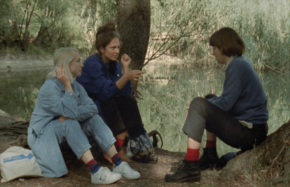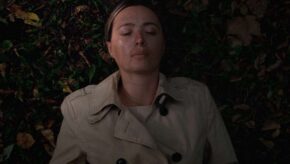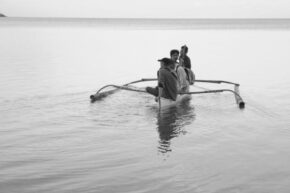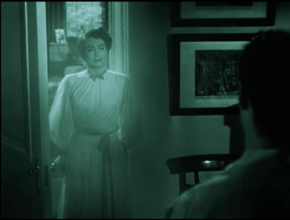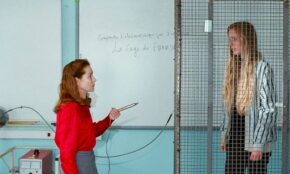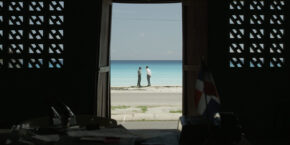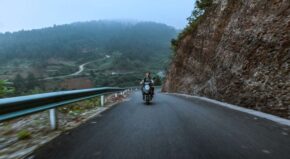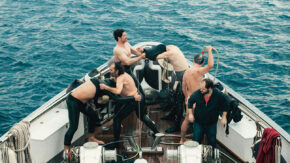Fall Festival Spotlight
El Gran Movimiento (Kiro Russo, Bolivia/France/Qatar/Switzerland)
By Jay Kuehner | 01/04/2022 | CS89, Fall Festival Spotlight, Festivals, From Cinema Scope Magazine, Spotlight
By Jay Kuehner The tacit assumption of the “city symphony” is of a metropolis invariably harmonious, conducive to and cooperative with the machinations of both camera and director, the coalescence of an industrial apparatus. Kiro Russo’s native La Paz defies any such arrangement in El Gran Movimiento, which channels the inherent dissonance and manifest disparity…
Read More → A Night of Knowing Nothing (Payal Kapadia, India/France)
By Erika Balsom | 01/04/2022 | CS89, Fall Festival Spotlight, Festivals, From Cinema Scope Magazine, Spotlight
The sleep of reason produces monsters—or so said Francisco Goya, who used the phrase as the title of an aquatint published in 1799. The words appear as if etched into the side of a desk, atop of which a male figure slumps in slumber. From behind him, the menace comes: bats, owls, and cats emerge from the darkness with petrifying gazes, crowding around the man.
Read More → Outside Noise (Ted Fendt, Germany/South Korea/Austria)
By Lawrence Garcia | 01/04/2022 | CS89, Fall Festival Spotlight, Festivals, From Cinema Scope Magazine, Spotlight
In 1984, the American philosopher and art critic Arthur C. Danto articulated a theory of the end of art. His claim—entirely distinct from declarations of the death of art—was not that art would no longer continue to be produced, but rather that there was no longer any “special way works of art have to be.”
Read More → Beginning (Dea Kulumbegashvili, Georgia/France)
By Lawrence Garcia | 12/22/2020 | CS85, Fall Festival Spotlight, Festivals, From Cinema Scope Magazine
By Lawrence Garcia Beginning opens with a sermon on the Old Testament tale of Abraham and Isaac, delivered to a Jehovah’s Witness congregation in Georgia’s predominantly Orthodox Christian Caucasus region. Just as the preacher, David (Rati Oneli), starts to expound on its implications regarding belief, the Kingdom Hall is firebombed by unseen attackers, transforming the…
Read More → The Calming (Song Fang, China)
By Courtney Duckworth | 12/22/2020 | CS85, Fall Festival Spotlight, Festivals, From Cinema Scope Magazine
By Courtney Duckworth Inertia implies stillness, but more precisely it means that without intervention any body resists change. The word conjures ceaseless motion as much as it does stasis—someone who cannot go on, or someone who can do nothing else. Something of this semantic tension imbues The Calming, writer-director Song Fang’s ascetic second feature. Lin…
Read More → Genus Pan (Lav Diaz, Philippines)
By Jesse Cumming | 12/22/2020 | CS85, Fall Festival Spotlight, Festivals, From Cinema Scope Magazine
By Jesse Cumming Marking Lav Diaz’s return to Venice four years and two features after winning the Golden Lion for the nearly four-hour The Woman Who Left, Genus Pan has invited easy jokes about its relative brevity by Diaz standards, clocking in as it does at a relatively efficient 156 minutes—even though it is, in fact,…
Read More → Her Socialist Smile (John Gianvito, US)
By Jordan Cronk | 12/22/2020 | Columns, CS85, Fall Festival Spotlight, From Cinema Scope Magazine
By Jordan Cronk In a year when even the most perfunctorily political film has been deemed newly relevant, it’s a 58-minute observational documentary from 2007 that, by quietly surveying the United States’ progressive past, points most perceptively to the struggle that has faced the American Left since long before 2020. A history of violence and…
Read More → There Are Not Thirty-Six Ways of Showing a Man Getting on a Horse (Nicolás Zukerfeld, Argentina)
By Devika Girish | 12/22/2020 | CS85, Fall Festival Spotlight, Festivals, From Cinema Scope Magazine, Uncategorized
By Devika Girish The films of Nicolás Zukerfeld pit images against words, staging wily games of onscreen meaning-making. Literary miscellanea often spur the ambulatory narratives of the Argentine director’s works: a mysterious letter opens into two Rashomon-esque views of a street encounter in the short La distancia entre las cosas (2008); annotated articles and battered…
Read More → Our Time (Carlos Reygadas, Mexico/France/Germany/Denmark/Sweden)
By Blake Williams | 01/02/2019 | CS77, Fall Festival Spotlight, From Cinema Scope Magazine, Spotlight
By Blake Williams For whatever thematic heavy-handedness or structural deficiencies Carlos Reygadas’ films may consistently and inevitably fall victim to, the man sure knows how to open a movie. Information, images, forms arrive from somewhere as something undefined—stars shining from who knows how far away; a small child lost in a field as day loses…
Read More → A Land Imagined (Yeo Siew Hua, Singapore/France/Netherlands)
By Lawrence Garcia | 01/02/2019 | CS77, Fall Festival Spotlight, Festivals, From Cinema Scope Magazine, Spotlight
By Lawrence Garcia About 20 minutes into A Land Imagined, the nominal protagonist, Detective Lok (Peter Yu), tells his partner of how, on his travels to various locales, he realized that he’d been to all of them before—in his dreams. “The strange thing is, I never saw those places as a child. How is this?”…
Read More → Nervous Translation (Shireen Seno, Philippines)
By Erika Balsom | 12/21/2018 | CS77, Fall Festival Spotlight, From Cinema Scope Magazine, Spotlight
By Erika Balsom Why is it that, when destined for adult audiences, narrative films about children so rarely accord their diminutive protagonists the privilege of inhabiting a world of their own? Place a child at the centre of a film, and type will frequently take hold, dictated by the law of genre: either he is…
Read More → The Green Fog (Guy Maddin, Evan Johnson, Galen Johnson, US/Canada)
By Lawrence Garcia | 12/19/2017 | CS73, Fall Festival Spotlight, Festivals, From Cinema Scope Magazine, Spotlight
By Lawrence Garcia That Guy Maddin’s feature-length follow-up to his most monumental work to date—the staggering mise en abyme of The Forbidden Room (2013)—would be The Green Fog, a 63-minute, found-footage video reimagining of Alfred Hitchcock’s Vertigo (1958), is entirely apropos (and a rather Maddin-esque sleight-of-hand) when one considers the fanfare with which The Green…
Read More → Madame Hyde (Serge Bozon, France/Belgium)
By Blake Williams | 12/19/2017 | CS73, Fall Festival Spotlight, Features, From Cinema Scope Magazine, Spotlight
By Blake Williams “It’s a cry echoed by a thousand sentinels An order relayed by a thousand heralds A beacon flaring up a thousand citadels A call to hunters lost in the great woods…” — Charles Baudelaire, “Les Phares” (1857) “A woman of fire makes no sense.” — Madame Hyde (Isabelle Huppert) In…
Read More → Cocote (Nelson Carlo de Los Santos Arias, Dominican Republic/Argentina/Germany)
By Jay Kuehner | 12/19/2017 | CS73, Fall Festival Spotlight, Features, From Cinema Scope Magazine, Spotlight
By Jay Kuehner The titular nape of the neck invoked in the word cocote is both a marked corporeal designation and an intimation of something bad about to happen. In Cocote, it represents the site of a beheading and the dreaded aura of imminent retribution. If hacer cogote translates as “to expect something,” then such…
Read More → Rat Film (Theo Anthony, US)
By Jordan Cronk | 12/19/2016 | CS69, Fall Festival Spotlight, From Cinema Scope Magazine, Spotlight
By Jordan Cronk Searching society’s margins for cultural lifeblood is a timeworn trait of nonfiction cinema. With Rat Film, director Theo Anthony goes one step further, looking to the gutters of Baltimore, Maryland, for evidence of the city’s muted pulse. Aptly premiering in Locarno’s Signs of Life program, Anthony’s debut feature takes as its nominal…
Read More → Austerlitz (Sergei Loznitsa, Germany)
By Jay Kuehner | 12/19/2016 | CS69, Fall Festival Spotlight, Festivals, From Cinema Scope Magazine, Spotlight
By Jay Kuehner If poetry after Auschwitz constituted an act of barbarism, then what can be made of curious tourists eating sandwiches, or snapping self-portraits, on the lawns of former concentration camps now repurposed as museums? The question isn’t so much posed as interrogatively embedded in Austerlitz’s conceptual framework, in which “dark tourism” is subjected…
Read More → Ceux qui font les révolutions à moitié n’ont fait que se creuser un tombeau (Mathieu Denis and Simon Lavoie, Canada)
By Adam Nayman | 12/19/2016 | CS69, Fall Festival Spotlight, Festivals, From Cinema Scope Magazine, Spotlight
By Adam Nayman How in the world did Ceux qui font les révolutions à moitié n’ont fait que se creuser un tombeau (Those Who Make Revolution Halfway Only Dig Their Own Graves) win the Best Canadian Feature prize this year at TIFF? I’m wondering this not because I think the film is unworthy, or necessarily…
Read More → Kékszakállú (Gastón Solnicki, Argentina)
By Jose Teodoro | 12/19/2016 | CS69, Fall Festival Spotlight, From Cinema Scope Magazine, Spotlight
By José Teodoro From the start of Gastón Solnicki’s Kékszakállú it seems like a boy’s boy’s boy’s world. In the opening moments three boys bound off a high diving board, followed by a girl whose hesitation is so prolonged the scene ends before we learn whether she follows suit or opts for retreat. We see…
Read More → Happy Hour (Hamaguchi Ryusuke, Japan)
By Michael Sicinski | 12/21/2015 | CS65, Fall Festival Spotlight, Festivals, From Cinema Scope Magazine, Spotlight
By Michael Sicinski It’s a strange film that calls to mind both Out 1 (1971) and Sex and the City. But Hamaguchi Ryusuke’s Happy Hour is defined by that odd tug between spacious, undirected improvisation on the one hand, and an incident-driven examination of the ups and downs of four women friends on the other.…
Read More → Kaili Blues (Bi Gan, China)
By Shelly Kraicer | 12/21/2015 | CS65, Fall Festival Spotlight, From Cinema Scope Magazine, Spotlight
By Shelly Kraicer The protagonist of Kaili Blues, Chen Sheng, is a small-town medical practitioner and ex-con. He bought his practice in Kaili, in southwestern China’s Guizhou province, with a small inheritance after his mother died while he was in jail. He’s not exactly a doctor; he’s more of a dreamer, a poet, and a…
Read More → Failure Hasn’t Spoiled Him Yet: Alan Zweig Succeeds in Spite of Himself
By Jason Anderson | 12/21/2015 | CS65, Fall Festival Spotlight, Festivals, From Cinema Scope Magazine
By Jason Anderson Alan Zweig’s Hurt is steeped in failures, not all of them belonging to the film’s unholy trainwreck of a subject, Steve Fonyo. In 1984, four years after a similarly valiant effort by Terry Fox that won the hearts and minds of the nation, the 18-year-old cancer survivor from Vernon, B.C. began a…
Read More → Chevalier (Athina Rachel Tsangari, Greece)
By Samuel La France | 12/21/2015 | CS65, Fall Festival Spotlight, From Cinema Scope Magazine, Spotlight
By Samuel La France It’s an irony surely not lost on Athina Rachel Tsangari that her Chevalier won the “Best Film” prize at the London Film Festival, considering that its story is built upon an obsessive quest to attain an even greater superlative. But even though the film finds six mostly well-off, middle-aged-and-up males pursuing…
Read More → Blood of My Blood (Marco Bellocchio, Italy)
By Blake Williams | 12/21/2015 | CS65, Fall Festival Spotlight, From Cinema Scope Magazine, Spotlight
By Blake Williams Back in 2006, Marco Bellocchio sent the Rome Film Festival a project called Sorelle, a curious 68-minute whatsit he shot over a six-year period with a MiniDV camcorder. He made it in collaboration with several film-school students in Bobbio (Bellocchio’s hometown), but, with a cast that includes his son (Pier Giorgio), daughter…
Read More → 


